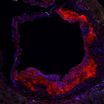(Press-News.org) In this News Digest:
Summary of a study being published online November 13, 2012 in the Journal of Clinical Oncology, reporting that earlier discussions about end of life (EOL) care preferences are strongly associated with less aggressive care in the last days of life and increased use of hospice care for patients with advanced cancer.
EOL care discussions that took place before the last 30 days of life resulted in less frequent use of chemotherapy in the last 14 days of life and lower use of acute or ICU care in the last 30 days of life, which are both known to impact quality of life in patients' final days.
Quote for attribution to Sandra M. Swain, MD, ASCO President
Links to additional information on Cancer.Net, ASCO's cancer information Website
A large population- and health systems-based prospective study reports earlier discussions about end of life (EOL) care preferences are strongly associated with less aggressive care in the last days of life and increased use of hospice care for patients with advanced cancer. The study, published November 13 in the Journal of Clinical Oncology, provides the first-of-its –kind scientific evidence that timing of EOL care discussions affects decisions about EOL care.
The findings suggest that initiating EOL care discussions before the last month of life provides the patients opportunity to make decisions regarding their EOL care preferences in a way that late discussions don't seem to do. Patients need time to process the information with their family and make good plans based on that information.
National guidelines recommend that oncologists initiate discussions about EOL care soon after a diagnosis of advanced cancer in order to ensure care aligns with patient goals and wishes. Current guidelines state that conversations should happen "during periods of relative medical stability rather than acute deterioration, and with physicians that know the patient well." In addition, ASCO's own recommendations for patients with advanced cancer include prioritizing discussions related to advanced cancer care preference upon diagnosis. This year ASCO also offered guidance on when oncologists should prioritize palliative and supportive care for patients with advanced cancer who have certain disease characteristics.
"Research has shown that choosing less aggressive care at the end of life offers important benefits for both patients and their caregivers. Patients have a better quality of life in their final days because there is a greater focus on symptom management, and they are more often able to receive care in their homes," said lead author Jennifer W. Mack, MD, MPH, a pediatric hematologist/oncologist at Dana-Farber/Children' Hospital Cancer Center. "This is also important because studies have shown that aggressive care is associated with a higher risk of depression among bereaved caregivers of cancer patients."
In the study, investigators identified discussions about hospice and resuscitation from with 1,231 patients (or surrogates of patients who were deceased or too ill to participate) with end-stage lung or colorectal cancer and via review of their medical records. They found that, on average, EOL discussions were initiated 33 days before death and 39 percent of those discussions occurred within the last 30 days.
Nearly half of all the study participants received at least one form of aggressive care, including chemotherapy in the last 14 days of life, intensive care unit (ICU) care in the last 30 days of life, and acute, hospital-based care in the last 30 days of life. However, compared with cases where EOL discussions took place within the last 30 days of life, cases with earlier EOL discussions were associated with less frequent use of aggressive care (34-45 percent vs. 65 percent) and increased use of hospice care (68-77 percent vs. 49 percent).
"Most patients who recognize that their cancer is terminal want to receive less aggressive care at the end of life," said Dr. Mack. However, aggressive care is still common in this setting, in part because discussions about the end of life are often postponed because they are difficult for both physicians and patients. This study also found that 17 percent of patients or surrogates did not recall EOL care discussions even though they were documented in the medical records, suggesting they may not have fully comprehended the content of the discussion.
The authors emphasize that more research is needed to explore how content of EOL care discussions affects patients' comprehension of the information and subsequent decisions made. In addition, the study underscores a need for a national emphasis from ASCO and many other professional and patient groups on advanced cancer care planning in physician education and training programs.
ASCO Perspective
Sandra M. Swain, MD, FACP, ASCO President
"Conversations about treatment options for advanced cancer are extremely difficult for patients, their families and their oncologist. But this study underscores a growing body of evidence that the earlier these conversations take place, the better because they have a real impact on a patient's quality of life in their final days. We need more education for physicians on topics like this and more training on communication skills for discussing prognosis."
To view a full copy of the study click here:http://www.jco.ascopubs.org/content/early/2012/11/13/JCO.2012.43.6055.full.pdf+html
Helpful Links from Cancer.Net, ASCO's cancer information website:
Guides to Cancer: http://www.cancer.net/cancer
Advanced Cancer Care Planning: http://www.cancer.net/coping/advanced-cancer-care-planning
Preparation at the End of Life: http://www.cancer.net/coping/end-life-care/preparation-end-life
Hospice Care: http://www.cancer.net/coping/end-life-care/preparation-end-life
When Caregiving Ends: http://www.cancer.net/publications-and-resources/oncologists-perspective/end-life-issues
Cancer.Net Podcast: The Art of Oncology – End-of-Life Care: http://www.cancer.net/coping/end-life-care/preparation-end-life
End-of-Life Issues: http://www.cancer.net/publications-and-resources/oncologists-perspective/end-life-issues
### The Journal of Clinical Oncology is the tri-monthly peer-reviewed journal of the American Society of Clinical Oncology (ASCO), the world's leading professional society representing physicians who treat people with cancer.
ATTRIBUTION TO THE JOURNAL OF CLINICAL ONCOLOGY IS REQUESTED IN ALL NEWS COVERAGE.
Study demonstrates that earlier end of life care discussions are linked to less aggressive care in final days of life
2012-11-14
ELSE PRESS RELEASES FROM THIS DATE:
Warming temperatures will change Greenland's face
2012-11-14
Global climate models abound. What is harder to pin down, however, is how a warmer global temperature might affect any specific region on Earth.
Dr. Marco Tedesco, associate professor of earth and atmospheric sciences at The City College of New York, and a colleague have made the global local. Using a regional climate model and the output of three global climate models, they predict how different greenhouse gas scenarios would change the face of Greenland over the next century and how this would impact sea level rise.
The resulting fine-scale model gives a high-resolution ...
Fast food menu options double; calorie counts remain high
2012-11-14
With grilled chicken, salads and oatmeal now on fast food menus, you might think fast food has become healthier. And indeed, there has been greater attention in the media and legislatively, paid to the healthfulness of fast food. But a close look at the industry has found that calorie counts have changed little, while the number of food items has doubled.
A study led by Katherine W. Bauer, assistant professor in Temple University's Department of Public Health and Center for Obesity Research and Education, found that the average calorie content of foods offered by eight ...
Study finds high exposure to food-borne toxins
2012-11-14
(SACRAMENTO, Calif.) — In a sobering study published in the journal Environmental Health, researchers at UC Davis and UCLA measured food-borne toxin exposure in children and adults by pinpointing foods with high levels of toxic compounds and determining how much of these foods were consumed. The researchers found that family members in the study, and preschool children in particular, are at high risk for exposure to arsenic, dieldrin, DDE (a DDT metabolite), dioxins and acrylamide. These compounds have been linked to cancer, developmental disabilities, birth defects and ...
Fantasy-reality confusion a primary cause of childhood nighttime fears
2012-11-14
From monsters under the bed to bogeymen in the closet, most children experience nighttime fears at some point in their development. And while most grow out of them without any professional intervention, others contend with persistent and extended periods of these fears, with a risk of developing anxiety problems later in life.
As part of a large-scale project on nighttime fears funded by the Israeli Science Foundation, Prof. Avi Sadeh of Tel Aviv University's School of Psychological Sciences is exploring how these fears fit into the normal developmental process — and ...
Injectable sponge delivers drugs, cells, and structure
2012-11-14
Cambridge, Mass. – November 13, 2012 – Bioengineers at Harvard have developed a gel-based sponge that can be molded to any shape, loaded with drugs or stem cells, compressed to a fraction of its size, and delivered via injection. Once inside the body, it pops back to its original shape and gradually releases its cargo, before safely degrading.
The biocompatible technology, revealed this week in the Proceedings of the National Academy of Sciences, amounts to a prefabricated healing kit for a range of minimally invasive therapeutic applications, including regenerative medicine.
"What ...
Targeting downstream proteins in cancer-causing pathway shows promise in cell, animal model
2012-11-14
PHILADELPHIA - The cancer-causing form of the gene Myc alters the metabolism of mitochondria, the cell's powerhouse, making it dependent on the amino acid glutamine for survival. In fact, 40 percent of all "hard-to-treat" cancers have a mutation in the Myc gene.
Accordingly, depriving cells of glutamine selectively induces programmed cell death in cells overexpressing mutant Myc.
Using Myc-active neuroblastoma cancer cells, a team led by Howard Hughes Medical Institute (HHMI) investigator M. Celeste Simon, Ph.D., scientific director for the Abramson Family Cancer ...
Vitamin D may prevent clogged arteries in diabetics
2012-11-14
People with diabetes often develop clogged arteries that cause heart disease, and new research at Washington University School of Medicine in St. Louis suggests that low vitamin D levels are to blame.
In a study published Nov. 9 in the Journal of Biological Chemistry, the researchers report that blood vessels are less like to clog in people with diabetes who get adequate vitamin D. But in patients with insufficient vitamin D, immune cells bind to blood vessels near the heart, then trap cholesterol to block those blood vessels.
"About 26 million Americans now have type ...
Being neurotic, and conscientious, a good combo for health
2012-11-14
Under certain circumstances neuroticism can be good for your health, according to a University of Rochester Medical Center study showing that some self-described neurotics also tended to have the lowest levels of Interleukin 6 (IL-6), a biomarker for inflammation and chronic disease.
Researchers made the preliminary discovery while conducting research into how psychosocial factors such as personality traits influence underlying biology, to predict harmful conditions like inflammation.
Known as one of the "Big 5" traits, neuroticism is usually marked by being moody, nervous, ...
Research strengthens link between obesity and dental health in homeless children
2012-11-14
Obesity and dental cavities increase and become epidemic as children living below the poverty level age, according to nurse researchers from the Case Western Reserve University and the University of Akron.
"It's the leading cause of chronic infections in children," said Marguerite DiMarco, associate professor at the Frances Payne Bolton School of Nursing at Case Western Reserve University.
Researchers Sheau-Huey Chiu, assistant professor, and graduate assistant Jessica L. Prokp, from the University of Akron's College of Nursing, contributed to the study.
Researchers ...
For brain tumors, origins matter
2012-11-14
Cancers arise when a normal cell acquires a mutation in a gene that regulates cellular growth or survival. But the particular cell this mutation happens in—the cell of origin—can have an enormous impact on the behavior of the tumor, and on the strategies used to treat it.
Robert Wechsler-Reya, Ph.D., professor and program director at Sanford-Burnham Medical Research Institute, and his team study medulloblastoma, the most common malignant brain cancer in children. A few years ago, they made an important discovery: medulloblastoma can originate from one of two cell types: ...



